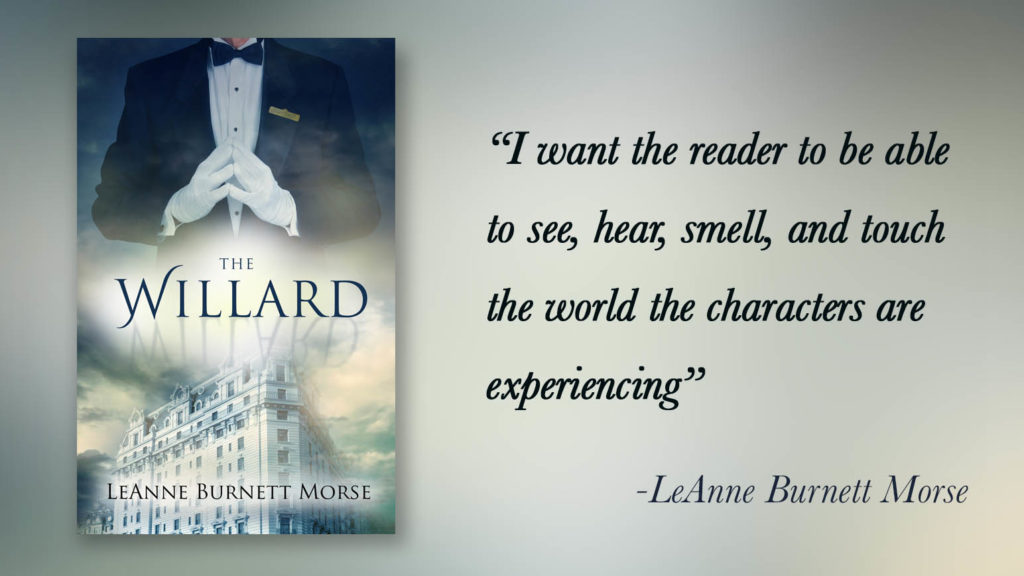Author Q&A with LeAnne Burnett Morse
A professional writer for TV, LeAnne Burnett Morse has just published her first novel ‘The Willard’, a historical fiction set around the real-life Willard Hotel in Washington D.C.

LeAnne talked to us about where and when she writes, the differences between writing for TV and writing books, and the college professor who had a huge influence on LeAnne’s early writing career.
Q. LeAnne, tell us about how you got into writing.
I’ve been writing professionally for television for 24 years. In 2015, I had a non-fiction book published and The Willard is my first novel. I have always wanted to write fiction and I’m enjoying it very much. I’m at work now on my second historic fiction novel.
Q. Where do you write?
I have an office in my home where I write a lot, but I like to get away from my regular surroundings sometimes when I need a jumpstart. I write in cafes, in hotels, and I’ve even been known to write while traveling on a bus chaperoning high school band students. If the creative juices are flowing I’ll write anywhere.
Q. Where do you get the ideas for your characters from?
My characters come from lots of places. Sometimes they are based on people I know, but often they come to life to fill a need in the story. That’s the case with the main character in The Willard. The different storylines in the book needed someone to bring them together, someone who was tied to the place and not just to the individual storyline. Edward Chase was created to fill that role and he ultimately became the primary character.
Q. How have your life experiences influenced your writing?
I have a great love of reading and history and my writing has been influenced by my love of those two things. I enjoy a variety of genres when I’m reading, but I tend to gravitate to historic fiction when I write. Reading has always been a way for me to relax and to escape my everyday world for any world of my choosing. That’s very powerful, and I find that when I’m writing I’m always striving to create an environment that is tangible for the reader. I want them to be able to see, hear, smell, and touch the world the characters are experiencing. As a television producer and writer, I had picture and sound to help me tell a story. With the written word it all has to be conveyed to the reader in a way that allows him to imagine my fictional world without sets, costumes, or music. It’s a challenge that I enjoy.
Q. How do you fit your writing in around your day job?
Since writing has been part of my day job for so many years, it’s not terribly different. I’m just not doing as much of the producing work as before. Coming from a creative field, I’m accustomed to self-motivating when it comes to creating something from scratch. It’s very hard to go from an idea to a working project to a finished project and sometimes just tuning out the rest of the world so I can sit down and focus on writing is tough. Because I write historic fiction, there is a hefty amount of research that goes into my work and it’s easy to get bogged down in that. I have to remind myself that I’m not writing a textbook and that, at some point, it’s time to stop researching and start building the fictional story around the factual bones. In that sense, it’s easier to think of it as a job and to apply the workday mentality to it.
Q. Which book has influenced you the most and why?
I can’t say that I’ve been influenced by a particular book, but I have been influenced by particular people. My seventh-grade English teacher was the first person to encourage my writing and one of my professors in college influenced me greatly by completely ripping my work to shreds (she used a green pen and my papers looked like an ogre was bleeding on them) to try and get me to stop using passive verbs. Some encouragement to let you know you have talent paired with some reminders that your work needs improvement can go a long way.
Q. What are you reading at the moment?
I just finished “A Moveable Feast” by Ernest Hemingway. It’s an interesting read because he’s describing his own life as a writer in Paris. It reminds me that there is something of the tortured artist in all writers, even if we aren’t living abroad, drinking wine, and spending our evenings in literary salons. Writing is a solitary pursuit that results in a product that you hand off to strangers and invite them to criticize it. I don’t think any of us would do it if we didn’t have a little something in our personalities that makes that notion seem normal.
Q. And finally, what would people be surprised to know about you?
People would probably be surprised to know that I’m a great admirer of antiquated vocabulary. I love to come across words that aren’t in common use and try to work them into my writing if it feels authentic to the character. That’s one of the benefits to working in historic fiction.
‘The Willard’ by LeAnne Burnett Morse is available now to buy on Amazon.
Let us know what you think in the comments section below.
We’re Peter and Caroline O’Connor. Creating beautiful book cover designs for authors all over the world is our passion. Every author should be able to benefit from a beautiful book cover design (not just the lucky few who get signed by a big publisher). We design, podcast, and coach authors full-time so we understand your struggles. Currently accepting new clients.
